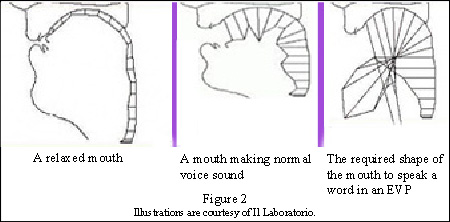Also at ethericstudies.org/scientific-method-itc/
These practices are recommendations provided under the
Creative Commons Attribution-Noncommercial-Share Alike 3.0 Unported License
Trans-etheric phenomena are thought to manifest as a subjective action causing an objective reaction. What is considered the scientific method by mainstream society is an ordered process of assessing what is known, developing a theory and conducting experiments to test the theory. Institutionalized science is able to support the additional and very important step of reporting results for collaboration on future research and to allow other, knowledgeable researchers the opportunity to comment on the work.
In its simplest form, the scientific method is applicable to paranormal research and should be considered a given for any research project. However, mainstream science has evolved this basic approach by preferring the study of induced events over spontaneous ones. For instance, studying reports of a phenomenon (field research) is not as well accepted as studying the recreation of those events under controlled conditions (clinical research). Since sightings of ghosts are spontaneous events and are not easily (if at all) replicated under controlled conditions, ghosts are rejected a priori.
Statistical analysis of experimental results has become an important tool for establishing a measure of significance for results. In fact, statistical analysis may as well be a requirement of mainstream methodology because lacking some statistical number indicating the significance of the results, the research will doubtless be rejected as pseudoscience.
EVP examples that can be heard over a speaker and understood without prompting by the average person (Class A EVP). are considered relatively rare; perhaps one in a thousand examples. Consequently, using mainstream science methodology with statistical analysis, virtually all Class A examples would be rejected from experimental results as deviating too radically from the statistical average for EVP.
The ATransC promotes the use of the basic elements of the scientific method as described below. However, that method must be evolved to better support the study of trans-etheric phenomena. Here are a few considerations:
-
Instead of using statistical analysis to look for small deviations from the norm, we recommend that experiments be designed to consider decisive results and reject results that are evident only after analyzing many tests. Using EVP as an example, this practice would reject Class C examples as possibly phenomenal, but unacceptable as data points: experimentally, if all that was recorded was Class C, then nothing was recorded.
-
The initial survey of prior art should not depend on previous work that is not more than eight-ten years old. In this field of study, what is known has a half-life of about eight years.
-
Base the hypothesis on material that has been vetted via peer review (subject-matter specialists). This is difficult today but will become practical as more people are producing well-documented reports that are subjected to peer-review.
-
Be sure to document assumptions and provide the rationale for the assumptions based on established work.
-
Conclusions should be contingent on replication of the work. A single study should not be represented as being decisive proof. Instead, it should be considered with other, similar studies as a trend.
Problems faced by researchers in this field:
-
There are too few similar studies to establish a meaningful sense of prior art.
-
People most qualified to conduct experimental studies of these phenomena seldom have an academic degree to give them credibility. If they have a degree, likely it is not in an applicable subject.
-
The community has not developed a culture of collaboration, careful study and peer-review.
Important Terms
Science: The observation, identification, description, experimental investigation, and theoretical explanation of phenomena. b. Such activities restricted to a class of natural phenomena. c. Such activities applied to an object of inquiry or study. 2. Methodological activity, discipline, or study. 3. An activity that appears to require study and method. 4. Knowledge, especially that gained through experience.*
Scientism: The belief that science, the scientific method and work product is the only way to validate reality. In practical terms, “scientism” holds that, if something is not recognized by mainstream science, then it is not real and is, therefore, impossible.
Scientific Method: A systematic approach to gaining understanding about a subject. In its simplest form:
- Explain the question
- Conduct background research including a survey of the “state of the art”
- Develop a hypothesis that puts the question and current understanding into a contextual framework
- Define a resulting question or prediction of behavior that can be derived from the hypothesis.
- Conduct experiments that test the question.
- Analyze the resulting information and develop a conclusion.
- Document the experiment, results and conclusion in a form that can be reviewed by others.
Variations of the scientific method include meta-analysis, which is really the analysis of similar work to find a trend, observational as conducted by early naturalists as they observed the behavior of living creatures, systems and interaction of systems, and experimental or clinical which involves an attempt to induce the predicted behavior in controlled conditions. All of these methods are based on the assumption that they are objective.
In the study of trans-etheric influences, observed phenomena thought to be the result of a subjective influence causing an objective effect. Consequently, attempts to apply the scientific method to trans-etheric phenomena has been less than successful and
Scientist: A person having expert knowledge of one or more sciences, especially a natural or physical science. In the context of this discussion, a scientist is a person working in the field for which he or she is academically trained. (from the American Heritage Dictionary)
![]()

